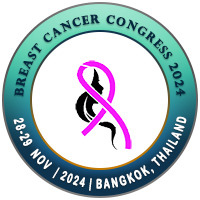
Daria Pasekova
City Clinical Oncology Dispensary, RussiaTitle: Conservative treatment of early hormone-dependent breast cancer in elderly patients(65 years and older)
Abstract
A significant proportion (40-50%) of new cases of breast cancer are being diagnosed among the patients with age 65 years and older. At the same time the most common tumors in this group are hormone-dependent, characterized by less aggressiveness and a more favorable prognosis.
Often, carrying out standard therapeutic measures, including surgical intervention, carries certain risks in this category of patients (intraoperative, postoperative complications) due the presence of serious concomitant pathology. In this situation, primary hormone therapy (PET) can be used as an independent conservative treatment. According to the literature describing the results of 7 randomized trials with a long follow-up period, there were no statistically significant differences in overall survival between groups of patients using PET (Tamoxifen) and standard complex treatment. In addition, conservative treatment preserves the patient's quality of life.
In our study, we evaluated the results of treatment of 78 patients older than 65 years (39 in the PET group and 39 in the control group) with stages I-II of hormone-dependent breast cancer. The primary end point were 5-year overall survival (OS) and progression-free survival (PFS) in the groups. Also we tried to identify factors connecting with progression.
We obtained the following results: there were no differences in 5-year PFS (log-rank p-value=0.28) and overall survival (log-rank p-value<0.5).
Factors associated with the development of progression: type of hormone therapy used ([RR]: 2.83; 95% CI: 0.91–8.8; p = 0.043), presence of affected lymph nodes ([RR]: 2.54; 95% CI: 1.17–5.49; p = 0.045) and no clinical response to treatment by 6 months of hormone therapy use ([RR]: 1.59; 95% CI: 1.09–2.3; p = 0.044).
Conclusions: in certain clinical situations (comorbidity, patient refusal of surgical treatment), it is possible to use a conservative approach (using aromatase inhibitors as PET) in treatment of elderly patients with early stages of hormone-dependent breast cancer.
Biography
Daria Pasekova finished oncology residency and post-graduation traineeship in Pavlov First Saint-Petersburg State Medical University. She works as a brest surgeon and sub-investigator in some trials.

